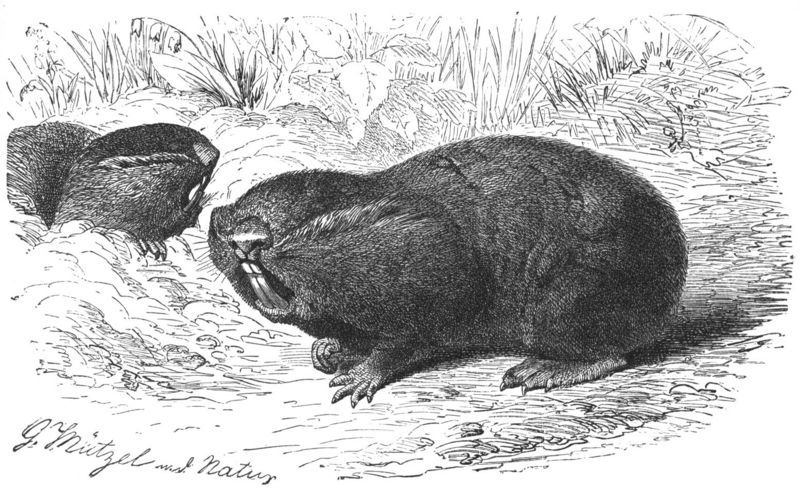|
| Query: Bathyergidae | Result: 4th of 4 | |
Blind Mole Rat (Spalacidae - Spalacinae) - Wiki
| Subject: | Blind Mole Rat (Spalacidae - Spalacinae) - Wiki
| |

| Resolution: 1554x948
File Size: 390417 Bytes
Upload Date: 2007:01:01 23:02:22
|
Blind mole rat
From Wikipedia, the free encyclopedia
[Photo] Original caption: "Blindmaus, Spalax typhlus Pall. 1/2 nat??rlicher Gr??ße." Translation (partly): "Nehring's blind mole rat, Spalax typhlus Pall. 1/2 natural size." Size: 5.2 x 3.2 in² (13.2 x 8.0 cm²). Originator: Gustav M??tzel. Source: Brehms Tierleben, Small Edition 1927
Blind mole rats are one of many types of rodents that are referred to as mole rats. The hystricognath mole rats of the family Bathyergidae are completely unrelated, whereas some other forms are also in the family Spalacidae. Zokors (subfamily Myospalacinae) and root and bamboo rats (subfamily Rhizomyinae) are spalacids sometimes referred to as mole rats. Blind mole rats are in the family Spalacidae, but are unique enough to be given a separate subfamily, Spalacinae.
Alternate opinions on taxonomy consider the blind mole rats to be the only members of the family Spalacidae and rank other spalacid subfamilies as full families. Other authors group all members of the superfamily Muroidea into a single family, Muridae.
Blind mole rats are truly blind. Their very small eyes are completely covered by a layer of skin. Unlike many other fossorial rodents, Blind mole rats do not have enlarged front limbs and do not appear to use their forearms as a primary digging tool. Digging is almost exclusively conducted using their powerful front teeth, which are separated from the rest of the mouth by a flap of skin. When a blind mole rat closes its mouth, its incisors are still on the outside. It has been suggested that blind mole rats may have evolved from spalacids that used their front limbs to dig, because their olecranon process is relatively large relative to the rest of the arm. The olecranon process is a part of the ulna bone where muscles attach, and digging animals tend to have enlarged olecranon processes to provide a lot of surface for their large and powerful muscles to attach.
Because they are completely blind, blind mole rats have been important laboratory animals in tests on how eyes and eye proteins function.
The Spalacinae contains a two genera and 8 species. Some authorities treat all species as belonging to a single genus, Spalax.
Taxonomy
Subfamily Spalacinae
* Genus Spalax - Ukrainian blind mole rats
o Spalax graecus
o Spalax zemni
o Spalax arenarius
o Spalax microphthalmus
o Spalax giganteus
* Genus Nannospalax - Mediterranean blind mole rats
o Nannospalax leucodon
o Nannospalax nehringi
o Nannospalax ehrenbergi
http://en.wikipedia.org/wiki/Blind_mole_rat
| The text in this page is based on the copyrighted Wikipedia article shown in above URL. It is used under the GNU Free Documentation License. You may redistribute it, verbatim or modified, providing that you comply with the terms of the GFDL. |
|
Comments |
|---|
| | Guest |
|
| The Nehring's blind mole-rat (Spalax nehringi) is a species of rodent in the family Muridae. It is found in Armenia, Georgia, and Turkey. |
^o^
Animal Pictures Archive for smart phones
^o^
|
|
|